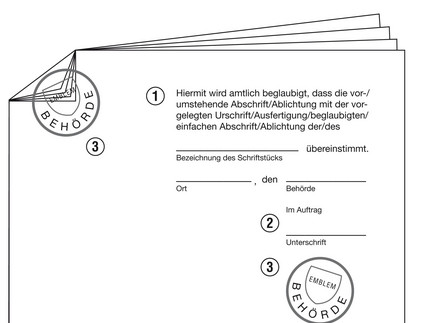Certifications
Certificates and records that must be submitted in officially certified copies for the purposes of admission or enrollment must meet the following standards.
An official certification must at least include:
- A note that certifies that the copy agrees with the original (certification note) incl. the name of the document,
- the place, the date and signature of the certifier, and
- the official stamp.
An official stamp includes always an emblem. A simple text-only stamp does not suffice.
If the copy is comprised of multiple individual sheets, it must be proven that each page comes from the same certificate. It suffices if only one page bears the certification note and the signature, insofar as all pages (e.g., like scales) are stamped over in such a way that part of the official stamp appears on part of every page.
Each page can also be certified separately. In this case, please ensure that every page of the original bears the name of the certificate holder. If this is not indicated on every page, then it must be incorporated in the certificate notes together with a note about the type of record or certificate.
If there is a copy on the front and back sides of a page, and the content on both sides is important, then the certification note must refer to the front and back sides (e.g.: “This hereby certifies that this copy agrees with the original.”). If this is not the case, then the front and back sides must be certified separately.
If the original was printed on embossed paper (with an embossing seal), this is typically not visible in the copy. The certification note on the copy must therefore include the fact that the original was printed on paper bearing the embossing seal of the issuer of the certificate/record.
If the certification does not meet these requirements, then the University of Potsdam will not recognize the certification.
A copy of an officially certified copy does not qualify as certified; it must be officially certified as well!
All agencies of the state, communities, offices and municipal associations, legal persons responsible for the supervision of the state under public law, are authorized to use an official stamp; e.g., residents’ registration offices, schools that issue certificates, notaries, regional insurance institutions, health insurance companies. The University cannot recognize certificates from banks, savings banks, churches, attorneys, financial auditors, associations, certified accountants, or the like.
Note regarding the certification of records from abroad:
In our experience, copies of international records are not all produced by conventional offices.
If you have problems in getting these records, it is best to consult with a notary or your home country’s embassy.
Legal foundations of certifications:
The proper execution of a certification is governed by Section 33 of the Administrative Procedure Act for the State of Brandenburg, dated March 9, 2004 (Law and Ordinance Gazette (GVBl.) I/04, p. 78) in combination with Section 2 subsection 4 of the HVV Bbg. The rules authorizing official certifications is affected by the ordinance on determining agencies in the state of Brandenburg authorized to conduct official certifications, dated August 30, 2011.

